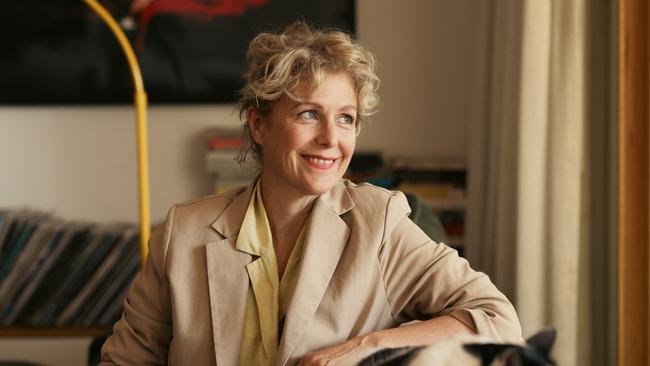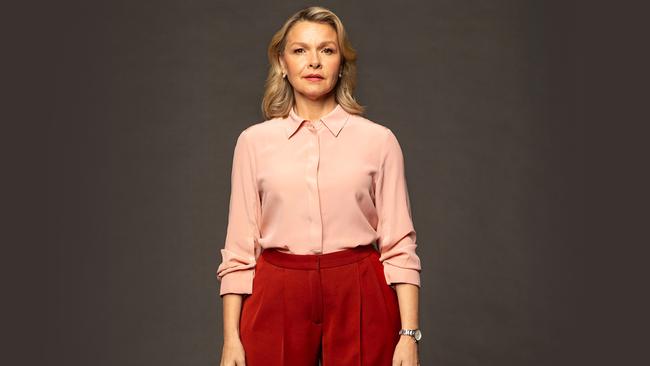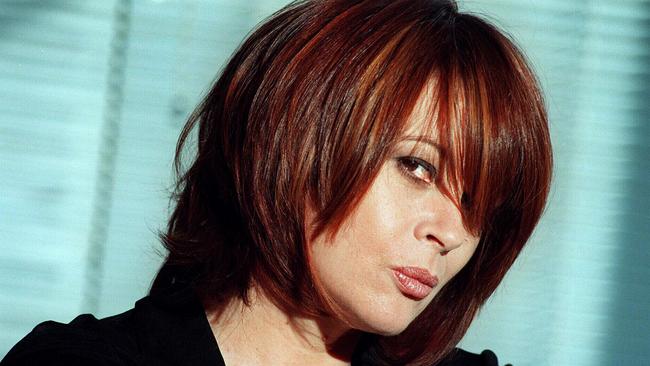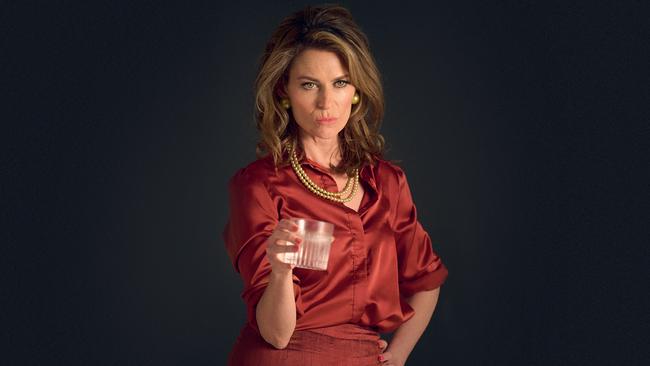Rock and rage: how do you explain Chrissy Amphlett to a new generation?
The Divinyls’ 1981 song Boys in Town was the first single theatre director Sarah Goodes ever bought – and she was struck by its atmosphere and power. She feels Chrissy Amphlett deserves a place in the pantheon of collective memory.

Theatre director Sarah Goodes thinks Australia has trouble embracing its own stories. And as the co-creator of Amplified: The Exquisite Rock and Rage of Chrissy Amphlett, she feels the Divinyls frontwoman deserves a place in the pantheon of collective memory.
“We’ve found a way … because otherwise young people won’t know who she is,” Goodes says. “Everyone’s going to see Jimmy Barnes, Midnight Oil, John Farnham, not a woman in sight. And if we don’t tell it now, it will be forgotten.”
Goodes has directed 20 new Australian works. They span her four years as a resident director at Sydney Theatre Company, five years as associate artistic director at Melbourne Theatre Company and her independent productions.
Yet, she says, “people are so eager to embrace stories from overseas and so critical of stories from here”.
Goodes suffers from neither tall poppy syndrome nor cultural cringe. From translating former Prime Minister Julia Gillard to the stage in Joanna Murray-Smith’s Julia to mythologising Heide artists in Anthony Weigh’s Sunday, she is eminently well-placed to bring legends to life.
Amphlett was both formidable and formative. The Divinyls’ 1981 song Boys in Town was the first single Goodes ever bought and she was struck by its atmosphere and power.
“There’s this inarticulate mixture of desire and menace,” Goodes says. “What she’s fighting, as a young woman you felt it … You were being pursued by it.”
Amplified, starring co-creator Sheridan Harbridge, is a one-woman cabaret tribute combining story and song. The show was conceived by Amphlett and friend Simon Morley before Amphlett’s death in 2013 and was picked up by Goodes five years ago.
“It’s got a mind of its own,” says Goodes, who admits it can take a long time for a work to reach the stage. “Sometimes it will tell you when it’s ready.”
Commissioned by University of Melbourne Arts and Culture as part of Rising Festival, the show is co-presented by Jacaranda, the Melbourne-based production company Goodes runs with actor/producer Diana Glenn. Jacaranda develops and adapts new Australian work for theatre, film, TV and online. Goodes is part way through a Masters of Screen Business at the Australian Film Television and Radio School to support the venture.
She has been a fierce proponent of uniquely Australian stories that tell us who and where we are, from developing and directing Kylie Coolwell’s Redfern-set Battle of Waterloo (2015) to staging the Australian classic Cosi (2019) and consulting for the Warumpi Band musical Big Name, No Blankets (2024).
Goodes’s journey in the industry began with an undergraduate exchange to San Diego that opened her up to the power of African-American and Latin-American playwrights. Then she performed on stage for a time, caught the directing bug while co-staging and performing in Anthony Minghella’s Cigarettes and Chocolate at The Kirk Gallery in Redfern, Sydney, and eventually landed a last-minute admission to the directing program at the VCA. It wasn’t until her 30s that she had her first assistant directing role at STC.
Telling the stories of Australians isn’t always straightforward (life rights, she mentions, are a challenge), but history and impersonation are for her less compelling. In directing Sunday (2023), a story involving still-living persons, she ultimately created a portrait of Melbourne as much as the eponymous Sunday Reed and her artists.
“Anthony and I talked about how we wanted it to be about place, the Melbourne light, the trees around the Yarra River,” she says. “Coming out of Covid, Melbourne audiences loved that.”
Her 2023 sellout success Julia, starring Justine Clarke, will return from June to September for an encore tour presented by STC and Canberra Theatre Centre. It’s not an impersonation: Clarke enters as herself and gradually transforms into Gillard for the climax of the infamous 2012 misogyny speech.

“If you’re going into a room with a great actor, you want to be witness to the craft of what they do, that transformation, because that’s hidden from you in TV and film,” Goodes says.
Similarly, Harbridge embodies Amphlett on stage, but it’s neither impersonation nor biography. “No one can be Chrissy,” Goodes says. “You’re forced to tell the story and capture the spirit of the music in a different way.”
Goodes believes theatre is “having a moment” and that audiences and performers are hungry for connection. It is also a forum in which producers can test their ideas and gain immediate feedback on their work before adapting it for other mediums such as film, television or online.
Some of Goodes’s favourite Australian films such as Babyteeth (2019) and The Sapphires (2012) were adapted from the theatre. With Jacaranda, she hopes to proactively bridge the gap between the different industries, state theatre companies and independent producers so that new Australian stories can reach as many audiences as possible.

There’s some frustration in lost opportunities for Australian film. Goodes directed Switzerland (2014), Murray-Smith’s play about author Patricia Highsmith, which has been picked up by London-and-Sydney-based Brouhaha Entertainment, to be produced by overseas talent. Brouhaha has also bought the rights to Charlotte Wood’s The Weekend (2023), another Australian adaptation directed by Goodes
The theatremaker says more opportunities should be provided for Australian directors and actors at home, lest they are forced to move overseas to find work.
“We’ve got all these great actors,” she says. “Unless we start giving more work to actors here telling our own stories, we’re going to have huge gaps (in the pool of available performers).”
To this end, she is excited to direct Murray-Smith’s adaptation of The Talented Mr Ripley at STC later this year with a cast of twenty-something lead actors (including Will McDonald from Heartbreak High as the titular Ripley). “It’s been great to find the next generation of young actors and let them make it their story,” she says.
Although she’s “obsessed” with Ripley, Goodes initially wondered whether it deserved retelling.
After all, the 1999 film was “perfect”, 2024’s Ripley TV series was still fresh and even Saltburn was a “churned up”, if cruel, mix of Brideshead Revisited and Ripley (although, she says, “I hated Saltburn. It was cold and mean.”) But retelling is evolution, not repetition, and Murray-Smith’s work offered a deep dive into Ripley’s interior.
“Theatre’s such a great space for psychology,” Goodes says. “The book is so much about (Ripley’s) psychological space and shame, wanting to kill that part of himself and every time he kills, it multiplies. That’ll be fun to explore.”
Goodes is fascinated by the power of theatre to cast light on psychological and cultural undercurrents. Her choice to direct Edward Albee’s Who’s Afraid of Virginia Woolf in 2023 (returning with STC in November), was clinched in a conversation with Kat Stewart, who plays the lead Martha, and their shared interest in “female rage”.
She says the connection between the infamous anger of women like Amphlett and Gillard and tidal “waves” of feminism is fascinating to her.

“(Rage) is a natural agent of change,” Goodes says. “There’s something so cathartic about watching George and Martha bash it out, watching Justine morph slowly into Julia and give that speech with incredibly precise and focused anger.
“Chrissy’s an incredible example herself in how she met rage head on. When people have no agency, they get angry. Unless you understand the tide underneath the outburst, it’s only ever an outburst.”
For Goodes, theatre is the space for discomfort, that essential back-and-forth of disagreement and forgiveness where rage — and love — can both be heard.
“How do we have the discipline to sit with a difficult problem and stay at the table?” Goodes says. “Theatre brings you together physically to look at the common experience of what it is to be human … it’s extraordinary.”
Amplified: The Exquisite Rock and Rage of Chrissy Amphlett is showing as part of RISING at the University of Melbourne, June 11-13; Julia shows at Arts Centre Melbourne, June 25 to July 20, and tours to QPAC and Merrigong Theatre Company; The Talented Mr Ripley is at Roslyn Packer Theatre, Sydney, from August 19, then Melbourne Arts Centre from October 28; Edward Albee’s Who’s Afraid of Virgina Woolf? is at Roslyn Packer Theatre from November 7.




To join the conversation, please log in. Don't have an account? Register
Join the conversation, you are commenting as Logout